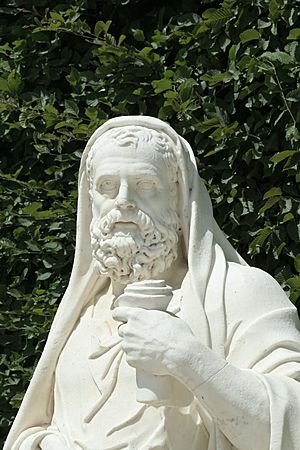Lysias facts for kids
Lysias (born around 445 BC, died around 380 BC) was a famous speech writer in Ancient Greece. He was known as a "logographer," which means he wrote speeches for other people to deliver in court or at public events. Lysias is considered one of the ten most important speakers from ancient Athens.
Contents
Life of Lysias
Lysias was born in Athens, but his father, Cephalus, was from Syracuse in Sicily. His family moved to Athens because the famous leader Pericles invited them. Lysias grew up in a wealthy family.
When he was about 15, Lysias moved to a new Greek colony called Thurii. There, he likely studied rhetoric, which is the art of speaking and writing effectively. He learned how to persuade people with words.
Later, a big war called the Peloponnesian War caused problems for Lysias and his family. Athens lost a major battle in Sicily, and this made people in Thurii suspicious of anyone connected to Athens. Lysias and his brother Polemarchus were forced to leave Thurii and returned to Athens in 412 BC.
Even though they were not full citizens of Athens (they were "resident aliens"), Lysias and his brother were very wealthy. They owned houses and even a shield factory that employed many workers. They also contributed a lot to public services, showing their loyalty to Athens.
Trouble with the Thirty Tyrants
In 404 BC, a group called the Thirty Tyrants took control of Athens. They were very harsh rulers. They targeted wealthy resident aliens like Lysias and his family. Lysias's brother, Polemarchus, was arrested and forced to die. Lysias himself barely escaped. He managed to bribe a guard and flee to Megara.
During this time, Lysias helped the Athenians who had been forced to leave their homes by the tyrants. When the tyrants were overthrown in 403 BC, the Athenians wanted to make Lysias a citizen because of his help. However, the proper steps were not followed, so he did not become a citizen.
A Career in Speech Writing
After these events, Lysias became a professional logographer. He wrote speeches for people who needed to speak in court. Many of his speeches were for ordinary citizens who were involved in legal cases. He was very busy writing speeches from 403 BC until about 380 BC.
One of his most famous speeches was Against Eratosthenes, where he accused one of the Thirty Tyrants of wrongdoing. This was his only direct involvement in Athenian politics.
Lysias also gave a speech at the Olympic festival in 388 BC. In this speech, he spoke out against Dionysius I, the ruler of Syracuse, calling him an enemy of Greece. Lysias probably died shortly after 380 BC.
Lysias's Writing Style
Lysias was famous for his clear and natural writing style. He made his speeches sound like the person delivering them was speaking naturally, not reading from a script. This was a new and artistic way to write speeches.
His language was simple and easy to understand, unlike some other speakers who used very grand or complicated words. He was known for the "plain style" of writing. This style was close to everyday language.
Lysias was also good at:
- Vivid descriptions: He could paint a clear picture with his words.
- Showing character: He made the people speaking his words sound like real individuals.
His speeches usually had four main parts:
- Introduction: To grab the audience's attention.
- Narrative: Telling the story or facts of the case.
- Proofs: Presenting evidence or arguments.
- Conclusion: Summarizing and making a final appeal.
Lysias's writing had a big impact on Greek prose. He showed that writing could be elegant and simple at the same time. His style helps us imagine what daily life in ancient Athens was like.
Lysias's Works
We have 34 complete speeches written by Lysias today. Many more speeches were known in ancient times, but they are now lost.
Here are some of his important speeches:
- On the Murder of Eratosthenes: This speech is about a man trying to prove that a murder he committed was not planned.
- Funeral Oration: A speech praising soldiers who died in war. Some experts think Lysias might not have written this one.
- Against Simon: A speech used in a legal case.
- Against Eratosthenes: This is one of Lysias's most famous speeches. He accused Eratosthenes, one of the Thirty Tyrants, of killing his brother. It gives a strong picture of the harsh rule of the tyrants.
- Against Agoratus: Another important speech that tells us about Athens right after the Peloponnesian War.
- Olympic Oration: A powerful speech given at the Olympic festival, urging Greeks to unite.
- On the Refusal of a Pension: A humorous speech where a man defends himself against accusations that he doesn't deserve a government payment for disabled people.
- Against Nicomachus: A speech used in a public case.
- Against Diogeiton: A speech where someone accuses a guardian of stealing money from the children he was supposed to protect.
Other Writings
Lysias is also believed to have written a speech that appears in Plato's famous book, Phaedrus. This speech is about love.
See also
In Spanish: Lisias para niños
 | Madam C. J. Walker |
 | Janet Emerson Bashen |
 | Annie Turnbo Malone |
 | Maggie L. Walker |


